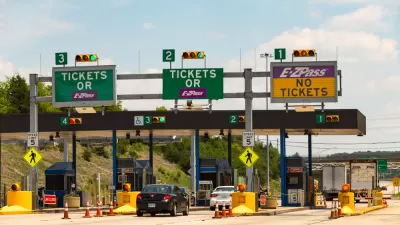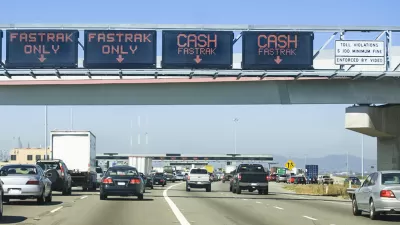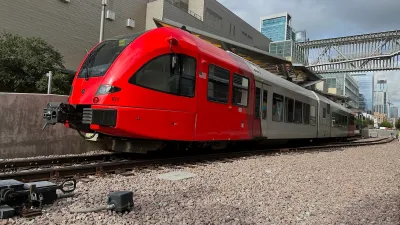There's a tug of war underway in Pennsylvania over $450 million a year in funding for public transit generated by the Pennsylvania Turnpike.
Ed Blazina reports on the messy battle over the financing of the Pennsylvania Turnpike, specifically the $450 million-a-year payment the Pennsylvania Turnpike Commission makes for public transportation.
Pennsylvania Auditor General Eugene DePasquale recently released an audit of the turnpike's finances while expressing support for a proposal by the commission to eliminate its PennDOT payment.
Mr. DePasquale said he supported the turnpike commission’s call for relief from the annual payments to the state Department of Transportation, which by law must use the money for transit subsidies. He said the commission is relying on inflated turnpike traffic numbers in estimating future revenues, and that won’t be sustainable if the agency keeps raising tolls to cover debt payments for money borrowed to pay PennDOT.
The report does not include, however, a plan for how public transit would replace that funding source. "Without funding from another source, either the turnpike or public transit agencies that receive an average of more than half of their funds from the state face serious financial hardship," writes Blazina to paraphrase the explanation offered by DePasquale. The article goes into a lot more detail about the finances of the turnpike and the public transit agencies that rely on funding from the state.
FULL STORY: State audit cites serious financial problems for Pa. turnpike

Alabama: Trump Terminates Settlements for Black Communities Harmed By Raw Sewage
Trump deemed the landmark civil rights agreement “illegal DEI and environmental justice policy.”

Planetizen Federal Action Tracker
A weekly monitor of how Trump’s orders and actions are impacting planners and planning in America.

The 120 Year Old Tiny Home Villages That Sheltered San Francisco’s Earthquake Refugees
More than a century ago, San Francisco mobilized to house thousands of residents displaced by the 1906 earthquake. Could their strategy offer a model for the present?

In Both Crashes and Crime, Public Transportation is Far Safer than Driving
Contrary to popular assumptions, public transportation has far lower crash and crime rates than automobile travel. For safer communities, improve and encourage transit travel.

Report: Zoning Reforms Should Complement Nashville’s Ambitious Transit Plan
Without reform, restrictive zoning codes will limit the impact of the city’s planned transit expansion and could exclude some of the residents who depend on transit the most.

Judge Orders Release of Frozen IRA, IIJA Funding
The decision is a victory for environmental groups who charged that freezing funds for critical infrastructure and disaster response programs caused “real and irreparable harm” to communities.
Urban Design for Planners 1: Software Tools
This six-course series explores essential urban design concepts using open source software and equips planners with the tools they need to participate fully in the urban design process.
Planning for Universal Design
Learn the tools for implementing Universal Design in planning regulations.
Clanton & Associates, Inc.
Jessamine County Fiscal Court
Institute for Housing and Urban Development Studies (IHS)
City of Grandview
Harvard GSD Executive Education
Toledo-Lucas County Plan Commissions
Salt Lake City
NYU Wagner Graduate School of Public Service





























